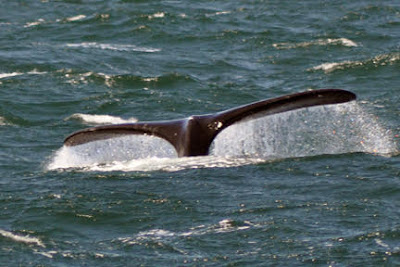The Nature of Conservation: Where are the North Atlantic right whale calves?
Photograph Credit: Krill Carson
Hi! This is Ingrid Biedron again, and this week I'd like to highlight North Atlantic right whales.
No new North Atlantic right whale calves have been sighted this season. Usually right whale calves are seen in January and February in ocean waters from Georgia to Florida. On average, about 17 calves are born per year. 2017 was a tragic year for the North Atlantic right whale. At least 17 right whales were found dead, 12 in Canada and 5 in the United States (US).
No new North Atlantic right whale calves have been sighted this season. Usually right whale calves are seen in January and February in ocean waters from Georgia to Florida. On average, about 17 calves are born per year. 2017 was a tragic year for the North Atlantic right whale. At least 17 right whales were found dead, 12 in Canada and 5 in the United States (US).
 |
| Right whale fluking off Race Point, Provincetown, MA. Photograph credit: Krill Carson |
Twenty years ago, the Vaquita, a porpoise species found in the Northern
Gulf of California, with about 30 individuals remaining and a handful of
fishing entanglements away from extinction, was in the same situation as the
North Atlantic right whale. Twenty years from now, the right whale may already
be extinct if we don’t act faster and more effectively to save them. Many
people, scientists, government officials, environmentalists, fishermen and
citizens are working hard to save the right whale. An international working
group has formed to find science-based solutions and the New England Aquarium
held a workshop on developing less dangerous fishing gear last month. The
awareness and concern for the plight of the right whale are heartening and
necessary to pull the species back from the brink of extinction. But they’re
not enough.
Summer is coming, and right whales can’t take another year like last
year. We must all act now to stop right whale deaths in Canada and the US. The
US and Canadian governments, scientists, environmental NGOs, fishermen and
public must find a way to slow down the ships and stop the entanglements now.
The snow crab season starts in the coming months and we need action by then. If
US senators and congresspeople and the Canadian government hear from their
citizens that they want to save the right whale, that gives them the political
cover they need to fight for the right whales.
If you want to help save the
North Atlantic right whale you can! The first step is to tweet, call, email,
write or visit your US senator or congresspeople, or if you live in Canada,
your representative and Prime Minister Trudeau. There is still time to save the
right whale, but we need to act now.
References:
https://news.nationalgeographic.com/2018/02/north-atlantic-right-whales-calving-season-extinction-spd/
https://www.nytimes.com/2018/02/28/science/north-atlantic-whales-endangered.html
https://www.npr.org/2018/02/28/589439219/researchers-havent-found-a-single-endangered-right-whale-calf-yet-this-season
https://www.worldwildlife.org/species/vaquita
http://www.dfo-mpo.gc.ca/science/environmental-environnement/narightwhale-baleinenoirean/index-eng.html






Comments
Post a Comment